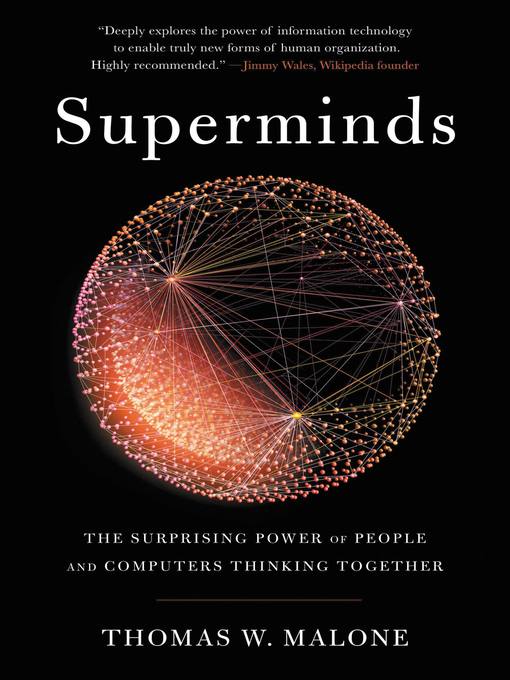
Superminds
The Surprising Power of People and Computers Thinking Together
کتاب های مرتبط
- اطلاعات
- نقد و بررسی
- دیدگاه کاربران
نقد و بررسی

March 15, 2018
Forget artificial intelligence. Instead, think collective intelligence, putting "AI in combination with humans who provide whatever skills and general intelligence the machines don't yet have themselves."It's not so much that the machines are going to supplant us, writes Malone (Management/MIT; The Future of Work, 2004), the director of the MIT Center for Collective Intelligence. It's that machines aren't quite capable--yet--of thinking in ways that humans do, just as machines can perform calculations that it would take generations of human thinkers to complete. Add IT to human brainpower, and you've got a supermind--with the operative notion being that the machines are aids to a collective of human thinkers who illustrate, in case after case, that "almost all of our important problems are solved by groups of people, rather than by individuals alone." While individual intelligence is important--and, writes Malone, intelligence tests are the best predictors of success in a broad range of human endeavors--it's the pulling together that's significant. Moreover, while smart people are certainly a desideratum, what counts more in powerful collective intelligence is "social perceptiveness," a matter in which women typically score higher than men. The author enumerates the cognitive processes that go into an intelligent system, including, importantly, the ability to learn from experience, which is perhaps not as widespread a talent as we might wish. That learning, in turn, may inspire platform revolutions. After all, Malone suggests, now that we're used to the ease of buying books and toothpaste online, why shouldn't we be able to shop for spinal surgery in the same way, so that "if consumers don't get what they want from their current doctors' offices, they're likely to go to other superminds in the market for medical services." The possibilities are endless.A book rich in speculation about how collective thinking might solve big problems such as climate change; of interests to fans of Daniel Dennett, Steven Pinker, and other big-picture thinkers.
COPYRIGHT(2018) Kirkus Reviews, ALL RIGHTS RESERVED.

May 1, 2018
Malone (founding director, MIT Ctr. for Collective Intelligence; Patrick J. McGovern Professor of Management, MIT; The Future of Work) presents a captivating analysis of the remarkable capacity for intelligence exhibited by "superminds," or groups of people and computers working together. He defines superminds as individuals acting together in ways that seem intelligent, and collective intelligence as the property that any supermind has, or that arises when superminds collaborate. He reminds readers that the history of humanity is largely the history of human superminds, of how people together accomplished more than any individual could have done alone. He also details how crucial computers will be for the superminds of the future to perform the complex kinds of thinking that humans do today. Malone's lofty work, while rich in speculation, blends exciting new science, many years of research, and numerous case studies to predict a bold new world. It nicely complements Steven Pinker's Enlightenment Now, Daniel Coyle's The Culture Code, and Geoff Mulgan's Big Mind. VERDICT Essential for university libraries supporting graduate curriculum in psychology, political science, business, and computer science, and for erudite fans of social, emotional, and collective intelligence.--Dale Farris, Groves, TX
Copyright 2018 Library Journal, LLC Used with permission.

























دیدگاه کاربران